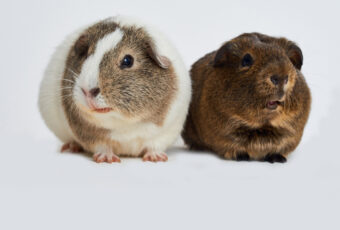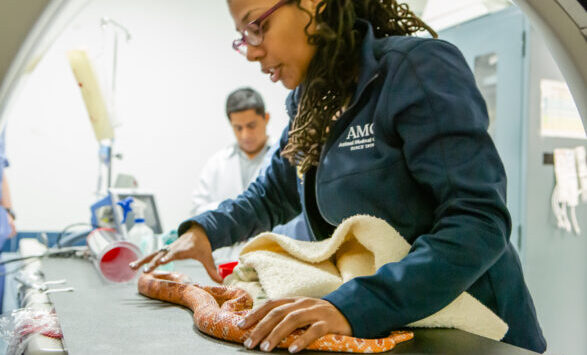Guinea Pig Care Guide

Background
Native to the Andes Mountains of South America, Guinea pigs are rodents that are common pets in the United States. Also called cavies, there are several common breeds including the Abyssinian (rough, short coat with cowlicks), the American/ English (classic shorthair) and the Peruvian (longhair). Guinea pigs are herbivores and need to feed continuously, therefore they produce fecal pellets continuously. Like rabbits, guinea pigs will form softer stools called cecotropes that they will ingest throughout the day. Guinea pigs typically live 5-8 years and are very social animals that do well in pairs or trios. It is important to note that guinea pigs and rabbits should not be housed together as rabbits can carry bacteria called Bordetella Bronchiseptica which, while usually harmless to rabbits, can be fatal to guinea pigs.
Habitat
A plastic bottom wire cage with paper product bedding is advised (such as CareFresh ®). Another creative and fun option is to make a cubes and coroplast or “CC” cage. These allow for more options with ramps, hides, multi-levels, tunnels, and environmental enrichment. A water bottle or a bowl should be placed in the cage. The dishes should be cleaned with soap and water often. Water bottles should be cleaned weekly with special attention to cleaning out the sipper tube itself with cotton tipped applicators and by placing it in boiling water.
Nutrition
Recommended daily diet (Introduce all new foods gradually to avoid intestinal upset):
Fresh Timothy hay (50% of diet)
Hay should be offered freely at all times. Second cutting Timothy hay is preferred, however first cutting Timothy hay is okay to feed. Trusted brands of hay include Oxbow and Farmer Dave’s Pet Supply. Alfalfa hay should only be fed to young or pregnant guinea pigs as its calcium content is too high for adults and can result in urinary tract problems.
High fiber Guinea pig pellets
Only varieties formulated specifically for guinea pigs will have the necessary vitamin C. Do not feed mixes with seeds or grains as these can lead to obesity and dental disease. Buy fresh pellets every 60-90 days as the Vitamin C content does not remain stable for longer than that time frame. Recommended brands include Oxbow and Sherwood Pet Health pellets.
Fresh fruit and vegetables
Feed leafy greens, including romaine lettuce and red/green leaf lettuce mixes, and vegetables such as red bell peppers, celery, cucumber, broccoli, and green beans. Herbs such as dill, basil, rosemary and oregano can be offered 1-2 times weekly in small amounts. Carrot pieces can be fed occasionally, but avoid baby carrots due to the high sugar content. Avoid high calcium/oxalate vegetables: spinach, kale, parsley, dandelion greens. Fruit, including strawberry, blueberry, citrus, and apples should be given only as treats. Avoid high sugar fruits such as bananas and grapes.
Vitamin C
Supplementation is not usually necessary if the pet is on a healthy pellet including one of the brands recommended above. Avoid supplementing vitamins in the water. Vitamin C supplementation may be warranted during times of illness.
Common Diseases and Illnesses
Scurvy (Vitamin C deficiency)
- Young, growing pigs and sick pigs are the most susceptible.
- The most important aspect of this disease is that the pet needs to be on a healthy diet
including a good quality pellet as well as fresh vegetables. - Symptoms can include a poor hair coat, painful joints, foot sores, and trouble eating.
Gastrointestinal Disease/Dental disease
- GI problems are often secondary to a poor diet or dental disease.
- Signs of dental disease include decreased appetite, drooling, unkempt hair coat, and
grinding the teeth. - A guinea pig that is not eating/defecating for over 12 hours should be evaluated
immediately.
Hair, skin, and foot disease
- Stress, boredom, or parasites can cause over-grooming behavior.
- Mites and ringworm are common problems in guinea pigs. These can be extremely
painful/itchy and may even cause seizures. - Pressure sores on the feet are seen in older guinea pigs. Obesity, Vitamin C deficiency, and wire-bottom cages are usually pre-disposing factors. These sores can lead to severe
infections in the bones, joints, and kidneys. - Examine the bottom of their feet once weekly and look for any abnormalities.
Respiratory Disease
- Signs can include nasal or ocular discharge, sneezing, abnormal breathing or weight
loss. - Respiratory disease is often due to bacterial pathogens. Other causes include cardiac
disease, viruses, or aspiration.
Reproductive Issues
- Sexual maturity arrives early in guinea pigs. Females are able to breed at 4-6 weeks old and
males at 9-10 weeks old. - Female guinea pigs that were not bred before 6 months of age will likely have complications
giving birth later in life. - Intact females are prone to mammary and uterine cancer later in life.
- Intact boars (males) may be prone to fecal impactions later in life and may require assistance in cleaning out their rectal pouch.
- Intact female guinea pigs have a high incidence of ovarian cysts.
Urinary Issues
- Urinary sediment or stones can be seen in guinea pigs with high calcium/oxalate diets
(excessive alfalfa hay or high calcium/oxalate vegetables). - Symptoms include bloody urine, straining, vocalization while urinating/defecating, and
hunched posture. This can be a life-threatening situation.
Veterinary Care
• Yearly physical exams
• Dental examination
• Weight determination with veterinarian
• Review diet /husbandry with veterinarian
Make an Appointment





























